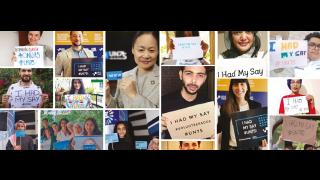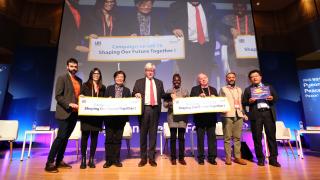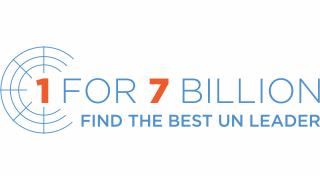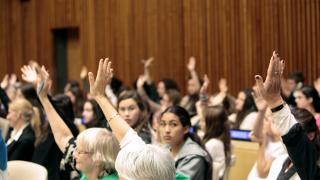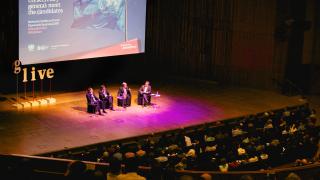
The opening words of the UN Charter make it clear that the United Nations is not the preserve of states alone.
After two devastating world wars, people across the globe felt keenly that they had a stake in this new organisation, created to save succeeding generations from the scourge of war. Civil society was engaged in discussions on the shape of the UN from the outset, feeding into the drafting of the UN Charter which went on to be proclaimed in 1945, not in the name of governments, but in the name of “We the peoples of the United Nations”.
Throughout the seven decades that have followed, civil society organisations (CSOs) have continued to play an instrumental role in furthering the UN’s objectives, from assisting with smallpox eradication programmes on the ground to shaping recent landmark agreements on sustainable development and climate change.
Today, the world’s seven billion people remain the Organisation’s most important stakeholders and beneficiaries. It is through their eyes that the UN’s record should be measured.
There are many ways in which the views of ordinary people are reflected at the UN, through governments, parliaments and the private sector for example, as well as through UN officials and experts. But it is often CSOs that are at the forefront of this work, standing up for the most vulnerable, for those unable to speak for themselves, and for those who are excluded, intentionally or otherwise, from formal processes.
CSOs engage with the UN in numerous ways, on the ground and at headquarters, and there are many excellent examples of CSO partnerships, such as the 2015 MyWorld survey which CSOs promoted widely to help almost 10 million people feed into the development of the SDGs. However, the quality and impact of collaboration varies greatly, and there is still a long way to go to ensure that the voices of the most vulnerable are heard and that UN programmes are responsive to the needs of those they are intended to serve.
Dialogue and cooperation with civil society will, I’m sure, be a central aspect of the activities of the UN in the next few years, not only because of my own activities, but because of the concerns that all the UN bodies have, making sure that partnership becomes a key element in solving global problems.
-- António Guterres, UN Secretary-General
António Guterres took office on 1 January 2017 following the most open selection process in the UN’s history, one that saw unprecedented engagement from civil society and the public. The process demonstrated – and stimulated – CSOs’ desire for deeper inclusion in the UN’s work.
But at this time of global uncertainty, the UN is stretched to the breaking point. More and more people are losing faith in institutions and political leadership, and nationalistic trends are presenting a grave challenge to the rules-based international system from which we all benefit. Public support for the UN is vital if a multilateral order is to be sustained, let alone deliver ambitious agendas on development and climate.
The UN must do all it can to protect, expand and in some cases, stem the shrinkage of civil society space both inside and outside the UN. Determined work on this front will help the UN earn legitimacy with the ‘peoples of the United Nations’ and strengthen public understanding and support for the Organisation.
For these reasons, the UN cannot afford to miss opportunities to deepen engagement with civil society and harness the energy and capacity of those, such as 1 for 7 Billion’s supporters, who want to work with the UN and rise to the challenge of securing a better world for us all.
The Secretary-General as a champion of civil society
The UN’s effectiveness is contingent on the trust placed in it by peoples and governments. As the Organisation’s top diplomat and an international civil servant, the Secretary-General has an important role to play not only in leading the UN’s programme of work, but also in improving public perceptions of the Organisation.
This means ensuring that the UN represents, as best it can, the hopes and needs of its primary stakeholders – the world’s seven billion people.
The more open, inclusive recruitment process has helped revitalise the UN, enhance its credibility, and reinvigorate its popular appeal. Having come through this new process gives the Secretary-General a mandate to lead on reforms relating to inclusivity and to capitalise on the widespread appetite for greater civil society and public participation in the UN system.
Proposals for improved civil society engagement
At present, substantial barriers remain to civil society participation at the UN. This publication, compiled by four of the 1 for 7 Billion campaign’s founding CSOs – the United Nations Association – UK, the Friedrich-Ebert-Stiftung New York Office, CIVICUS and Avaaz – showcases articles from a diverse range of perspectives within 1 for 7 Billion’s community that outline practical proposals for improved civil society engagement at the UN.
The articles are not intended to be a comprehensive or representative reflection of the opinions of the world’s civil society, but rather a collection of perspectives from individual civil society organisations united by their aspiration to work productively alongside the UN in pursuit of common interests.
Whilst the collection touches on a variety of areas of the UN’s work, the span is by no means exhaustive. Despite this, we believe the publication highlights important areas of concern and makes a compelling case for improvements to the way the UN engages civil society.
We invite the Secretary-General to shine a light on this agenda and drive it forwards where possible, and ask member states and decision-makers to support Mr Guterres in his work.


